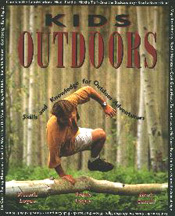  |
||||
| Home | Books | Recent Writing | ||
|
Test your knowledge of leave no trace camping and hiking as well as other outdoor skills. Some answers are worth one point, while others are good for two points. Answers for points scoring follow each question. More details on each response follow the entire quiz. If you get no points, do us all a favor and stay out of the backcountry. For 1-10 points, you are a certified couch potato. For 11-15 points, you are ready for the outdoors. More than 16 points, you are a backcountry guide. No matter how you rate in the quiz, if you love getting out in the outdoors, you'll love Kids Outdoors. Hint: The answers are practical and not always at the extreme of leave no trace. 1. Your walking a trail with two other hikers. Three miles in from the road, one of the other hikers slips off a steep slope. The hiker is now 20 feet down a steep embankment with what seems to be a badly broken leg and a vicious bruise on the forehead. You should: A. Cut through the woods to the nearest road and flag down a car for help.B. Splint the leg and help the hiker walk back to the trailhead. C. Stay with the injured hiker while the third member of your group hikes back to the trailhead for help. D. Act like you have never seen the injured hiker before, complete your hike and watch the evening news to find out what happened.
A. Head to the woods with a trowel, keeping at least 200 feet from any water source and well off from camp to spread out the impact on the campsite and your nose.
A. Take both rings apart by scattering
the rocks in the woods and packing out the trash.
A. A mortal sin punishable by a lifetime in hell under any circumstances.
A. Eaten. You have to take the bad parts
with the good when trying to leave no trace.
A. Earth tones to blend in with the surroundings.
A. Swim across the rapids doing the crawl stroke to get to the bank as fast as you can.
A. Get enough wood to keep the fire burning
all night in case you get a really good joke-telling session going.
A. Set up the tent and keep quiet while he drifts off to sleep.
A. Packing it out.
Answers in detail:1. C Don't move a badly injured person unless you have extensive first aid training and are properly equipped to do so. Give yourself 2 points for C and no points for any other answer. 2. B Give yourself 2 points for using a smelly privy. You get 1 point for answer A. You should have used the privy, but at least you followed leave no trace guidelines when you hit the woods. 3. C At an established site, it is overly optimistic to assume that other campers will forgo a fire. But taking the second ring apart will concentrate the later use to one site. Give yourself 2 points for answer C and one point for answer B, which takes leave no trace practices a bit too far for an established campsite. 4. B Let's be realistic. Safety should come first, but only bend the rules if you are really in danger. Give yourself 2 points for answer B and just one point for taking things too far with answer A. 5. D Pack out any trash, natural and otherwise. It takes banana peels and peanut shells to long to rot in the woods and they could be dug up by animals if buried. Give yourself 2 points for answer D, and no points for any other answers (eat peels and shells if you like, but you won't get any points for it here). 6. A Give yourself 2 points for selecting gear that won't clash with the outdoors. It will make your camp less intrusive on your fellow campers wilderness experience. Give yourself 1 point for answer B, though, because an international orange coat, vest or pack cover will make winter hiking safer in areas frequented by hunters. You don't get 2 points, however, because getting all your gear in orange is a little too much. 7. D Keep your feet pointed downstream to absorb the shock of running into rocks. Give yourself 2 points for D and no points for other answers. Trying to swim across the current in big rapids will only send you over a falls sideways and unprotected. Work with the current not against it. 8. C or D Give yourself 2 points for either response. It is true that you should forgo a campfire whenever possible, but the question did ask what to do if you are going to have a fire. Gathering wood away from the campsite will prevent that surface-of-the-moon, picked-over look that well-worn campsites get. 9. B You get 2 points for recognizing signs of hypothermia, even when the temperature is well above freezing. You should have to take away a point (but don't) if you laughed at answer D. If you hiking buddy doesn't have dry clothes and you can't get enough warm food and drink into him to stop the shivering, the next step is to use your own body heat to warm him up. Don't worry about how this story will sound when told at school, your hiking partner's life is at stake. 10. C You get 2 points for this answer. Go ahead and give yourself
1 point each for either A or D. They are a little extreme to be practical,
but either of these would work. |
||||
|
|
||||
 The
Outdoors Skills Quiz
The
Outdoors Skills Quiz